Related Research Articles
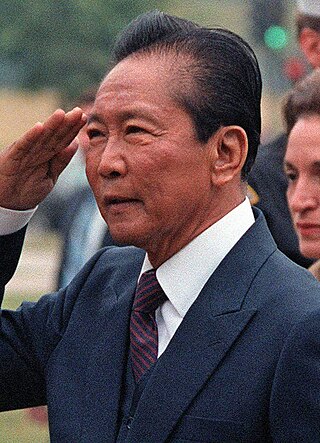
Ferdinand Emmanuel Edralin Marcos Sr. was a Filipino politician, lawyer, dictator, and kleptocrat who was the 10th president of the Philippines from 1965 to 1986. He ruled under martial law from 1972 until 1981 and kept most of his martial law powers until he was deposed in 1986, branding his rule as "constitutional authoritarianism" under his Kilusang Bagong Lipunan. One of the most controversial leaders of the 20th century, Marcos's rule was infamous for its corruption, extravagance, and brutality.
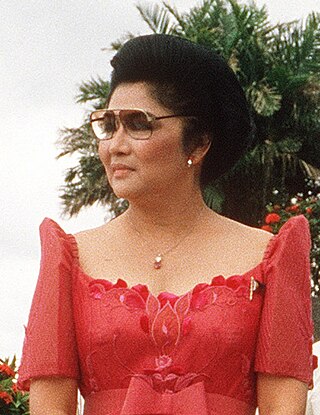
Imelda Romualdez Marcos is a Filipino politician who served as the First Lady of the Philippines from 1965 to 1986, wielding significant political power during the Presidency of her husband, 10th president Ferdinand Marcos. She is the mother of current president Bongbong Marcos.

Ferdinand "Bongbong" Romualdez Marcos Jr., commonly referred to by the initials PBBM or BBM, is a Filipino politician who is the 17th and current president of the Philippines. He previously served as a senator from 2010 to 2016. He is the second child and only son of 10th president and dictator Ferdinand Marcos Sr. and former first lady Imelda Romualdez Marcos.
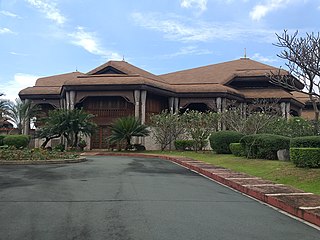
Coconut Palace, also known as Tahanang Pilipino, is a government building located in the Cultural Center of the Philippines Complex in Manila, Philippines. It was the official residence and the principal workplace of the vice president of the Philippines during the term of Jejomar Binay.

Maria Cielito "Pops" Lukban Fernandez is a Filipina singer, entertainer, entrepreneur, TV host and actress.

The Cultural Center of the Philippines is a government-owned and controlled corporation established to preserve, develop and promote arts and culture in the Philippines. The CCP was established through Executive Order No. 30 s. 1966 by President Ferdinand Marcos. Although an independent corporation of the Philippine government, it receives an annual subsidy and is placed under the National Commission for Culture and the Arts for purposes of policy coordination. The CCP is headed by an 11-member Board of Trustees, currently headed by Chairperson Margarita Moran-Floirendo. Its current president is Arsenio Lizaso.
George Masangkay Canseco was a Filipino composer and former politician. He composed numerous popular Filipino songs.
Dovie Beams Villagran was an American actress, best known for having an illicit sexual affair with former Filipino President Ferdinand Marcos from 1968 to 1970.

Maria Socorro "Kuh" Hashim Ledesma is a Filipino singer and actress. Born in Manila, Philippines with a Lebanese lineage and Ilonggo parents, she moved to Bacolod for college where she met some of her future Music and Magic band mates.
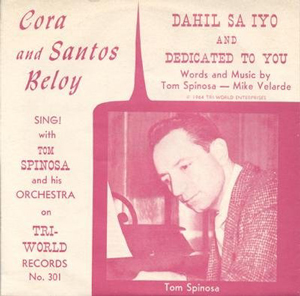
"Dahil Sa Iyo" is a song by Mike Velarde, Jr., written in 1938 for the movie, Bituing Marikit and sung by Rogelio de la Rosa. A version with English-Tagalog lyrics, recorded in 1964, was a hit in the United States and continues to be popular in Filipino communities on American soil.

"Handog ng Pilipino sa Mundo", released in English as "A New and Better Way—The People's Anthem," is a 1986 song recorded in Filipino by a supergroup composed of 15 Filipino artists. The song serves to commemorate the bloodless People Power Revolution which ended President Ferdinand Marcos's 20-year rule, as well as a benefit single for the rehabilitation of Radio Veritas, a public affairs radio station instrumental in the revolution. The lyrics of the song are inscribed on a wall of Our Lady of EDSA Shrine, the center of the revolution.

Maria Amapola Cabase, better known by her stage name Amapola, is a Filipina singer, actress, musician, television and radio host. She is widely known in the Philippines as the original artist for the song "Kapantay ay Langit", which was later popularized by Pilita Corrales. Philippine First Lady Imelda Marcos dubbed Cabase as a "Music Ambassador" for the country in 1973 in celebration of Amapola's first concert in New York, November 3, 1973, at New York's Town Hall. In 1984, she released her international debut album produced in collaboration with jazz pianist Bobby Enriquez, who led the Cal Tjader Trio for Amapola's debut jazz album, Sophisticated Lady.
Imelda is a 2003 documentary film directed by Ramona S. Diaz about the life of Imelda Marcos, former First Lady of the Philippines. Beginning with her childhood, the film documents her marriage to future President of the Philippines Ferdinand Marcos, her rule under the dictatorship, her exile in Hawaii and her eventual return to the Philippines.

Ferdinand Martin Gomez Romualdez is a Filipino businessman, lawyer and politician serving as the Speaker of the House of Representatives since July 25, 2022. He is also serving as the Representative for the 1st district of Leyte since 2019 and previously from 2007 to 2016. He formerly served as the House Majority Leader from 2019 to 2022, and unsuccessfully ran for senator in the 2016 elections. He is a first cousin of President Bongbong Marcos
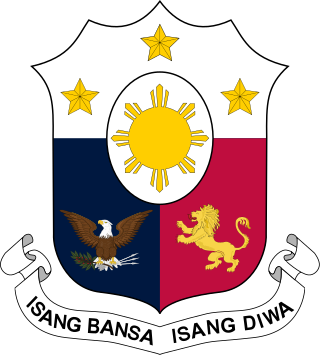
Isang Bansa, Isang Diwa was the national motto of the Philippines from 1978 to 1986, during the presidency of President Ferdinand Marcos. It was adopted on June 9, 1978 by virtue of Presidential Decree No. 1413. The motto has been criticized and has been denounced as "the slogan of a fascist regime".
The term "Marcos mansions" refers to at least 50 upscale residences in the Philippines of the family of President Ferdinand Marcos. These are aside from the various overseas landholdings of the Marcos family, which are spread around the world. The Supreme Court of the Philippines considers these landholdings as part of the "ill-gotten wealth" of the Marcos family, based on the definitions set forth in Republic Act No. 1379, which had been passed in 1955.

The Marcos family is a political family in the Philippines. They have established themselves in the country's politics, having established a political dynasty that traces its beginnings to the 1925 election of Mariano Marcos to the Philippine House of Representatives as congressman for the second district of Ilocos Norte; reached its peak during the 21-year rule of Ferdinand Marcos as president of the Philippines that included his 14-year dictatorship beginning with the declaration of Martial Law throughout the country; and continues today with the political careers of Imelda Marcos, Imee Marcos, Sandro Marcos and reached its peak again with the presidency of Ferdinand Marcos Jr.

The Marcos jewels generally refers to the jewelry collection of the Marcos family – most famously that of former First Lady Imelda Marcos. However, it also specifically refers to three collections of jewelry which were recovered by the Presidential Commission on Good Government (PCGG) in 1986, which the Philippine Supreme Court had ruled to be part of the Marcoses' unlawful wealth.

The overseas landholdings of the Marcos family, which the Philippine government and the United Nations System's Stolen Asset Recovery Initiative consider part of the $5 billion to $13 billion "ill-gotten wealth" of Ferdinand and Imelda Marcos, are said to be distributed worldwide in places including California, Washington, New York, Rome, Vienna, Australia, Antilles, the Netherlands, Hong Kong, Switzerland and Singapore. These are aside from the fifty-or-so Marcos mansions acquired by the Marcos family within the Philippines itself.

The Marcos family, a political family in the Philippines, owns various assets that Philippine courts have determined to have been acquired through illicit means during the presidency of Ferdinand Marcos from 1965–1986. These assets are referred to using several terms, including "ill-gotten wealth" and "unexplained wealth," while some authors such as Philippine Senator Jovito Salonga and Belinda Aquino more bluntly refer to it as the "Marcos Plunder."
References
- ↑ "George Canseco, 70; songs live 'Ngayon at Kailanman'". Philippine Daily Inquirer. 20 November 2004. Retrieved 22 June 2009.
- ↑ "Kuh Hits Back". BusinessWorld (Philippines). 16 May 2003. Retrieved 22 June 2009.